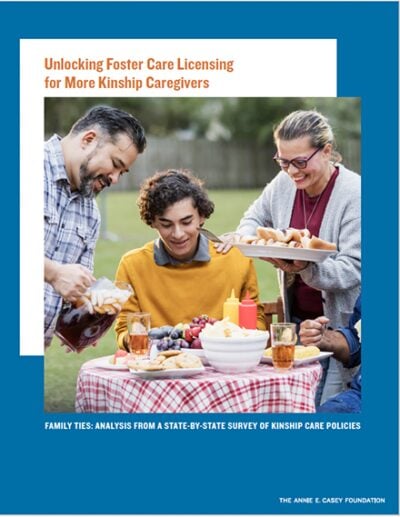A Step in the Right Direction
Over the past 15 years, many states have reduced barriers to foster care licensing for kin with provisional approvals and waivers, but more can be done.

This brief, the first in a five-part series, shares the findings of a comprehensive survey of state-level kinship care policies.
Kinship care is an important option to consider for kids moving through the child welfare system. A timely placement with relatives or close family friends can reduce the trauma a child experiences from being separated from their parents, siblings, friends, communities and even social support resources, such as schools and churches.
The survey results presented in this report highlight increasing efforts by states, the District of Columbia and Puerto Rico to promote kinship care and support the caregivers of children who are known to the child welfare system. At the same time, the report calls on states to do more to help willing kin caregivers access and benefit from foster care licensing.
The Annie E. Casey Foundation asked Child Trends to survey state child welfare administrators with an end goal of documenting the full landscape of kinship policies across states and identifying needed improvements. The survey, fielded in 2022, updates and expands on the findings of a similarly comprehensive survey conducted in 2007. Agencies in all 50 states, the District of Columbia and Puerto Rico received the 2022 survey. Forty-six agencies completed it.
The survey paints an encouraging picture of kinship care policies in 2022. It finds that many states have taken steps to help unlock resources available through licensing for kinship caregivers. Caregivers who are willing and able to become licensed foster parents gain access to important resources, including financial assistance. However, many kin who are willing to fill the role — and who welcome the children placed in their homes by child welfare agencies — cannot meet the licensing requirements of their state or jurisdiction. In most states, these kin caregivers miss out on financial assistance and other support services that would benefit the children in their care.
This brief examines survey data related to two state policies that help kinship caregivers obtain foster home licenses. The first policy involves obtaining a provisional or emergency license. This process enables kin to receive a temporary license and begin caring for a child who is in state custody without first meeting all required standards of foster parent licensing.
The second policy governs the availability of waivers for certain foster home licensing requirements that do not affect a child’s safety. On a case-by-case basis, states can waive some standards — such as required size of the home or number of bedrooms — to help relatives obtain the license. These policies can reduce barriers to licensure for relatives and, in doing so, unlock needed resources for the children and kin caregivers involved.
In 2023, a federal regulation change created new opportunities for families. The change allows states to dispense with existing waiver policies and instead develop licensing standards that are tailored to the unique circumstances of kinship caregivers. Many states are exploring this option.
Casey's survey of kinship care policies finds that states can build on past progress to make it easier and smoother for willing kin to become licensed foster parents. Ultimately, policymakers can learn from and leverage these findings to respond to emerging opportunities, further reduce barriers to licensing and increase support for kinship caregivers.
Understanding what states are doing to support kinship caregivers can inform new policies and practices. Both provisional licensing and waiver policies suggest that states are committed to placing children with kin, and they are also committed to supporting these placements.
States can and should build on this momentum by implementing a new federal rule that allows them to create kin-specific licensing standards. This rule also requires states to offer equivalent support to both licensed kinship caregivers and licensed foster parents.
The end goal is simple: bolster support for kinship arrangements to help keep families together.
We hope you'll find value in this report. We’d love to get a little information from you, which we'll use to notify you about relevant new resources.